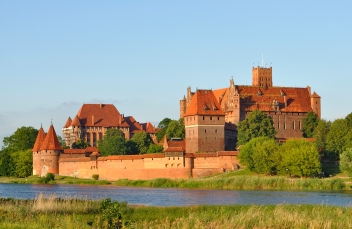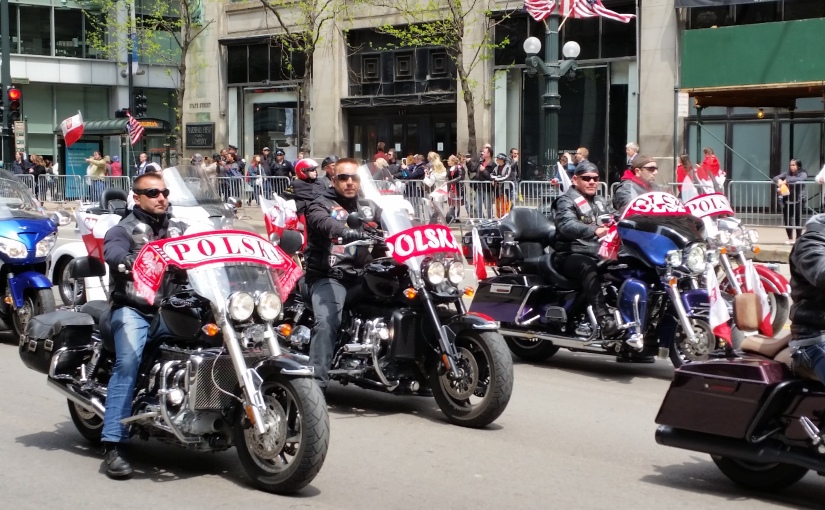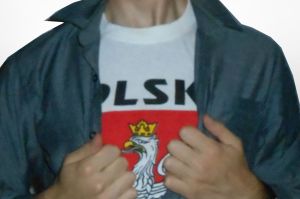One of the things my friends always ask me is why I’m so crazy about Poland when I wasn’t even born in that country. Some of them just don’t see why Poland matters. “What contributions has Poland made to the world?” they ask.
The answer is more than they think. I have compiled the following list to BEGIN demonstrating what Poland has to offer. There is no particular order to this list (So, no, I’m not saying that pączki are better than Saint Pope John Paul II).
1. Pączki:
Pączki are one of those foods that have transcended cultural borders to become a staple of universal cuisine. Whether you’re American, German, Australian or Dutch, chances are you’ve sunk your teeth into those fluffy balls of fruit-filled delight. Just remember that you have Poland to thank.

2. Vitamins:
Do you take Vitamin C when you feel like you’re getting sick? Perhaps you take a daily multivitamin to supplement your health. You can thank a Pole, Casimir Funk, for discovering the concept and existence of vitamins in 1912. Although, I’m not sure if that’s the reason some vitamins have such a funky taste.

3. Heliocentricity:
The earth revolves around the sun. Duhhhh. But we wouldn’t have known that if it weren’t for Polish astronomer Nicolaus Copernicus, who proved this phenomenon in the 16th century. For centuries prior to this, the accepted theory was that the earth was the center of the universe and the sun revolved around it. Not only did Copernicus discover the opposite (heliocentricity), but this discovery helped spur the Scientific Revolution.

4. Saving Europe…TWICE:
In its history, Poland fought back two invasion forces that had the potential to completely change the social and political fabric of the European continent. The first was in 1683 when King John III Sobieski repulsed a massive Ottoman invasion at the gates of Vienna. The second occured in 1920 when Poland miraculously defeated a Soviet onslaught into the west during the Battle of Warsaw.

5. X-Rays:
Next time you’re getting your tooth X-rayed at the dentist’s office, remember Marie Skłodowska Curie, a Polish female scientist who helped develop X-ray technology and was the first woman ever to win the Nobel Prize. She also discovered a new element and named it Polonium, after her home country.

6. Big, Beautiful Castles:
OK, OK, many countries have castles. But Poland has the largest castle on the planet at Malbork. Built by the Teutonic Knights in the 14th century and later captured by the Poles, the massive fortification stretches for 52 acres. Still, I must note that there is some friendly competition between Malbork Castle in Poland and Prague Castle in the Czech Republic, which many sources also claim to be the largest castle in the world.

7. Polish Women:
In my experience, Polish women are intelligent, resourceful, tough, moral and beautiful. Sure, you find these qualities, and lack thereof, in all nations, but I can only speak to the great influence strong Polish women like my mother and grandmother had on me.

8. Polish Chocolates:
Forget Butterfingers and Hershey Bars. Poland offers a celestial collection of delectable confections that will leave you addicted and begging for more. From Wawel, to E. Wedel, to Prince Polo, you can’t go wrong with any Polish chocolate.

9. Kiełbasa Sausage:
I just know I’m going to get comments asking me “Why didn’t you make Kiełbasa number one, two and three on this list, Crazy Polish Guy?” Well this list has no particular order, so maybe this is number one. Honestly, though, how could I make any list of fantastic Polish things without including kiełbasa? For some people, Poland’s whole purpose is kiełbasa.

10. Polish Grandmothers:
They’re kind, loving and willing to force-feed you in ways that would make any CIA interrogator cringe. Everyone loves their grandma, whether she’s Polish or not, but we people of Polish descent have a certain image that comes to mind when we think of our Polish grandmothers; God bless them. Check out how to tell if your grandma is Polish.

11. Alcohol:
Żywiec, Tyskie, Krupnik, VODKA. What would the world do without them? And they’re all Polish (Yes, Russia, we’re claiming the Vodka). What would you do without Poland? Give thanks, my friends! Give thanks!

12. The Lato Font:
Lato, that font style that everyone is using these days on new business presentations and school projects, is a Polish invention. The typeface, which is the Polish word for summer, was developed in 2010 by Warsaw designer Łukasz Dziedzic.

13. Legendary Classical Music:
You may recall the famous funeral march song that they always used to play in cartoons. That happens to be one of the most widely recognized musical pieces by Polish composer Frédéric Chopin. Not only is he the most famous Polish musician of all time, but he is right up there in the same league as Ludwig van Beethoven and Peter Tchaikovsky when it comes to legendary composers.

14. Saint Pope John Paul II:
One of the most cherished figures in Poland, Saint Pope John Paul II, born Karol Wojtyła, is beloved and respected worldwide for having lead an exemplary life of piety and forgiveness, while simultaneously helping rip apart the fabric of communism in Eastern Europe. Among his most saintly acts was visiting the person who tried to assassinate him and offering him forgiveness. All across the world people revere his name, and Poland gave him to us.

15. Polish People
The world’s estimated Polish population is 60 million. Those 60 million people can be found anywhere from Albania to Zambia, and if you count the people who are part Polish and part some other nationality (which I do), the number is likely far higher. Poles and people of Polish descent make important contributions to all aspects of global society, from politics, to coal mining and from sports to scientific research and development. I can assure you that this 0.8% of the world’s population packs a powerful punch.




















 There’s roughly 60 million Polish people living on the planet, and we come in all shapes and sizes. You could say there are different “levels” of being Polish. Here are those levels the way I see them.
There’s roughly 60 million Polish people living on the planet, and we come in all shapes and sizes. You could say there are different “levels” of being Polish. Here are those levels the way I see them. Level 4: The Crazy Pole
Level 4: The Crazy Pole